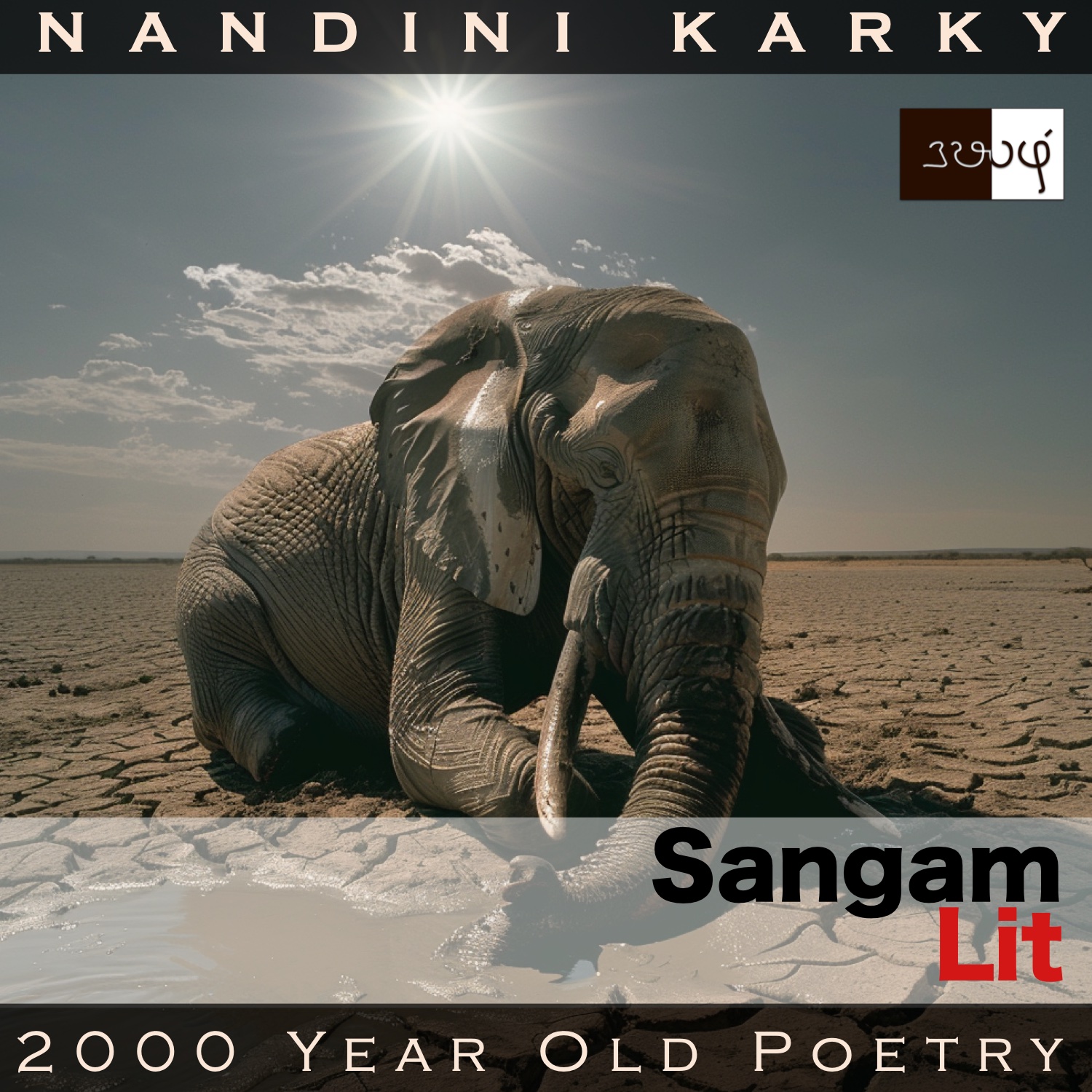Podcast: Play in new window | Download
Subscribe: Apple Podcasts | Spotify | Amazon Music | Android | iHeartRadio | TuneIn | RSS | More
In this episode, we listen to reflections on the nature of wealth, as portrayed in Sangam Literary work, Kalithogai 8, penned by the Chera King Paalai Paadiya Perunkadunko. The verse is situated in the ‘Paalai’ or ‘Drylands landscape’ and ponders on the question of what is lasting wealth.

நடுவு இகந்து ஒரீஇ நயன் இல்லான் வினை வாங்க,
கொடிது ஓர்த்த மன்னவன் கோல் போல, ஞாயிறு
கடுகுபு கதிர் மூட்டிக் காய் சினம் தெறுதலின்,
உறல் ஊறு கமழ் கடாத்து ஒல்கிய எழில் வேழம்,
வறன் உழு நாஞ்சில் போல், மருப்பு ஊன்றி நிலம் சேர,
விறல் மலை வெம்பிய போக்கு அரு வெஞ் சுரம்
சொல்லாது இறப்பத் துணிந்தனிர்க்கு ஒரு பொருள்
சொல்லுவது உடையேன்; கேண்மின், மற்று ஐஇய!
வீழுநர்க்கு இறைச்சியாய் விரல் கவர்பு இசைக்கும் கோல்
ஏழும் தம் பயன் கெட, இடை நின்ற நரம்பு அறூஉம்
யாழினும் நிலை இல்லாப் பொருளையும் நச்சுபவோ?
மரீஇத் தாம் கொண்டாரைக் கொண்டக்கால் போலாது,
பிரியுங்கால் பிறர் எள்ள, பீடு இன்றிப் புறம் மாறும்
திருவினும் நிலை இல்லாப் பொருளையும் நச்சுபவோ?
புரை தவப் பயன் நோக்கார் தம் ஆக்கம் முயல்வாரை
வரைவு இன்றிச் செறும் பொழுதில், கண் ஓடாது உயிர் வௌவும்
அரைசினும் நிலை இல்லாப் பொருளையும் நச்சுபவோ?
என ஆங்கு
நச்சல் கூடாது பெரும! இச் செலவு
ஒழிதல் வேண்டுவல், சூழின், பழி இன்று
மன்னவன் புறந்தர வரு விருந்து ஓம்பி,
தன் நகர் விழையக் கூடின்,
இன் உறல் வியன் மார்ப! அது மனும் பொருளே.
Here’s an intellectual discourse on the nature of wealth to persuade a person to change their path! The verse can be translated as follows:
“Akin to a king’s sceptre, which doles out cruelty, straying far away from the fair path of justice, as dictated by a compassionless subordinate, the sun spreads its rays with much haste and scorches the land with fury. Here, a once-handsome elephant, fragrant with musth and swarming with bees, now starved and thirsty, bends down to the land leaning on its tusk, looking like a plough, in that victorious mountain that has now burnt down to become an inaccessible hot drylands domain. To such a place, you dare to leave without even telling us. I wish to tell you one thing. Listen, O lord!
A lute’s music spreads ecstasy in those who listen. Even more unstable than a lute, whose middle string is broken, making all seven strings lose their purpose, is fading wealth. Why do you desire it so?
When it arrives in the hands of someone, it makes them celebrated, and when it parts away, it leaves them to the scorn of others. Such is the dishonourable nature of fame that keeps changing its face. Even more unstable than this fame is fading wealth. Why do you desire it so?
Without understanding the noble intentions of those who worked for his benefit, in a moment of boundless anger, without even blinking his eye, a king takes away a person’s life. Even more unstable than such a king is fading wealth. Why do you desire it so?
And so, you shouldn’t desire it, O lord! You need to abandon this journey. If you think about it, the pleasant state of being as one with her, who desires to stand with you, her lord, beside her, and offer feasts of hospitality in her home, O lord with a wide chest, only that can be stable wealth!”
Let’s explore the details. The verse is situated in the context of a man’s parting from his lady, after marriage. When the lady’s confidante realises the man’s intention of parting away without telling them, she says these words to him. The confidante begins by placing in parallel the scorching, punishing heat of the drylands and the rule of a cruel king, who simply listens to the words of his unkind subordinates and strays away from the fair path of justice. Coming from the pen of this poet- king, this holds special value. The confidante describes the drylands so, where a once-handsome and wild elephant now bows low, searching for a few drops of water in that parched land, and as it presses its tusk into the ground, it looks like a plough. She continues saying this is where the man wants to go, that too without even telling the lady. Deciding to give him a few choice words, she starts to talk about the nature of wealth.
Again, in the three-step style of Kalithogai, she goes on to compare wealth with a lute, whose middle string is broken, fame which brings glory to a person when it arrives and scorn when it parts, and finally, another king reference, one, who is so blinded by rage that he does not stop to consider the merit or the good deeds of the person in front but orders them to be instantly executed. In all three cases, the confidante concludes even more unstable than these three elements, is the state of wealth, which is fleeting. She advises the man not to hanker after wealth and tells him that the state of being with the lady and making her fulfil her only wish of being hospitable to the world in her home, is what can be considered true and forever wealth. ‘There can be nothing more precious than togetherness’ is the perspective put forth with precision in this verse from the past!




Share your thoughts...